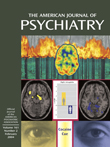Are Oppositional Defiant and Conduct Disorder Symptoms Normative Behaviors in Preschoolers? A Comparison of Referred and Nonreferred Children
Abstract
OBJECTIVE: The authors’ goal was to test the hypothesis that DSM-IV symptoms of oppositional defiant disorder and conduct disorder can be validly applied to preschoolers. METHOD: Using a semistructured diagnostic interview, they assessed rates of symptoms of DSM-IV oppositional defiant and conduct disorders in 2.5–5.5-year-old children who were referred to a psychiatry clinic and a comparison group of nonreferred children. RESULTS: Clinically referred preschool children had significantly higher rates of oppositional defiant and conduct disorder symptoms than nonreferred children. Among nonreferred preschoolers, rates of all oppositional defiant and conduct disorder symptoms were at or below 8%. CONCLUSIONS: DSM-IV symptoms of oppositional defiant and conduct disorders distinguish referred from nonreferred preschool children in a pattern consistent with that seen in older children. Preschool children who are not seeking mental health services do not have high rates of disruptive behavior problems. The DSM-IV nosology appears to be a valid diagnostic system for discriminating between typical and atypical disruptive behaviors in preschool children.



